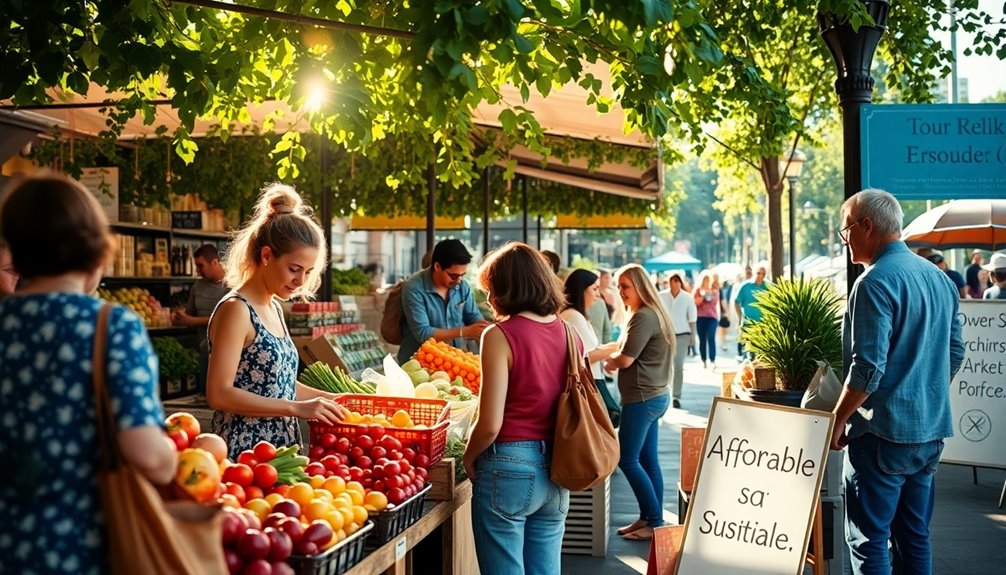To practice mindful consumption in today's consumer-driven world, start by evaluating the environmental and social impacts of your purchases. Choose quality products that last, support brands with sustainable practices, and research items thoroughly before buying. Opt for secondhand goods whenever possible and engage in local swap events. Remember, every choice counts, and being aware can lead to a more sustainable future. If you're curious about practical steps to make better choices, there's more to explore.
Key Takeaways
- Research products thoroughly, assessing their entire lifecycle and sustainability practices before making purchases to ensure informed choices.
- Prioritize quality over quantity by investing in durable goods, which reduces waste and provides long-term value.
- Embrace a circular economy by choosing secondhand items and participating in local swap events to minimize resource depletion.
- Implement a waiting period for non-essential purchases to combat impulse buying and encourage thoughtful decision-making.
- Support ethical brands that prioritize sustainability, fostering responsible consumption and contributing to a healthier planet.
Understanding Mindful Consumption

While you navigate the complexities of modern shopping, understanding mindful consumption can transform the way you make purchasing decisions.
As a mindful consumer, you recognize the environmental, social, and ethical impacts of your choices. Research shows that 64% of global consumers are concerned about climate change, which emphasizes the need for sustainable purchases.
By prioritizing quality over quantity, you can considerably reduce waste and save money in the long run. Your consumer behavior reflects a commitment to social responsibility, as you actively avoid brands associated with pollution.
Prioritizing quality over quantity fosters social responsibility and minimizes waste, ultimately saving you money.
To practice mindful consumption effectively, research products and companies, considering their lifecycle and sustainability practices before buying. This thoughtful approach not only benefits you but also contributes to a healthier planet. Furthermore, opting for energy-efficient solutions, such as ground source heat pumps, can significantly lower your carbon footprint and promote sustainability.
The Importance of Awareness in Our Choices

Being aware of the impact of your purchases is essential in today's world.
By evaluating a product's lifecycle and prioritizing ethical sourcing, you can make choices that not only benefit you but also the planet.
This awareness empowers you to support brands that align with your values and contribute to a more sustainable future. For example, opting for grass-fed butter can enhance the nutritional quality of your cooking while supporting sustainable farming practices.
Understanding Impactful Purchases
As you navigate your shopping choices, understanding the impact of your purchases becomes essential for fostering a sustainable future.
Mindful consumption involves considering the environmental, social, and economic consequences of what you buy. With growing concern about climate change, it's vital to prioritize sustainable brands and support local businesses.
- Choose quality over quantity to reduce waste and resource depletion.
- Research product certifications to avoid greenwashing and support genuine eco-friendly initiatives.
- Recognize the impact on the environment by opting for products with sustainable packaging.
Additionally, being aware of the nutritional benefits of the foods you consume can enhance your overall health and well-being.
Evaluating Product Lifecycles
How often do you consider the entire lifecycle of a product before making a purchase? Evaluating product lifecycles can greatly influence your choices as a mindful consumer. By understanding the environmental impact from raw materials to disposal, you can make informed decisions that minimize waste. Check out the table below to visualize key aspects:
| Phase | Considerations | Impact |
|---|---|---|
| Raw Materials | Sourcing & extraction | Environmental cost |
| Production | Energy use, labor practices | Ethical concerns |
| Usage | Lifespan & repairability | Longevity |
| Disposal | Recycling & waste | Circular economy |
Prioritizing sustainable practices helps you support brands that align with ethical consumption practices, contributing to a healthier planet. Additionally, being aware of the health benefits of rapeseed honey can encourage you to choose products that not only sustain the environment but also support your well-being.
Prioritizing Ethical Sourcing
When you prioritize ethical sourcing, you're not just making a purchase; you're supporting fair labor practices and environmental sustainability.
By embracing mindful consumption, you enhance consumer awareness and contribute to a positive social impact. More shoppers are choosing products made with sustainable materials, reflecting a demand for transparency in supply chains.
- 75% of European shoppers prefer sustainable packaging.
- 64% of global consumers express concern about climate change.
- 22% of shoppers actively seek to minimize waste. Additionally, solar energy provides economic benefits through job creation in manufacturing, installation, and maintenance sectors.
Key Factors to Evaluate Before Purchasing

Before making a purchase, you should consider the environmental impact of the product.
Think about how it's produced, transported, and disposed of, as well as the ethical sourcing behind it.
Evaluating these factors helps guarantee your choices align with your values and contribute to a sustainable future. Additionally, considering the impact of wood-burning on air pollution can inform your decision-making and promote healthier alternatives.
Environmental Impact Assessment
As you consider a purchase, it's vital to evaluate the environmental impact of the product throughout its entire lifecycle.
This holistic view helps you understand how your choice contributes to greenhouse gas emissions and resource depletion.
- Investigate the sustainability practices of brands, focusing on eco-friendly materials and sustainable packaging.
- Assess energy consumption; opting for energy-efficient devices can greatly lower your carbon footprint and utility bills.
- Support local businesses, as purchasing locally minimizes transportation emissions and strengthens your community's economy.
- Additionally, consider the use of renewable resources, as products that utilize these materials often have a lower overall environmental impact.
Ethical Sourcing Considerations
Evaluating ethical sourcing is essential for making informed purchasing decisions that align with your values. Start by examining the environmental impact of products, including their carbon footprint from production to disposal.
As you shop, prioritize brands that emphasize fair labor practices, ensuring workers are treated fairly and compensated adequately. Supporting local businesses not only strengthens community economies but also reduces transportation emissions, contributing to sustainable living.
Look for brands that are transparent about their supply chains and sustainability practices to avoid misleading claims. Third-party certifications can also help you identify genuinely sustainable products, ensuring your choices are socially responsible. Additionally, understanding cookie usage on e-commerce sites can help you make more informed choices regarding data privacy while shopping.
Practical Steps for Mindful Consumers

To make mindful consumption a reality, you should start by researching products thoroughly before making any purchases. This guarantees you're making informed decisions about their environmental impact and the company's sustainable practices.
Emphasize quality over quantity by investing in durable items that lower your carbon footprint.
Consider these practical steps:
- Choose secondhand goods or participate in local swap events to embrace a circular economy.
- Implement a waiting period for non-essential purchases to resist impulse buying and reflect on your values.
- Support ethical brands that prioritize sustainability, fostering responsible practices in your community. Additionally, consider how color accuracy influences not only the visual appeal of your devices but also their overall sustainability and longevity.
Researching Products Mindfully

How can you guarantee that your purchases align with your values? Start by researching products mindfully.
Look into a product's entire lifecycle to assess its environmental impact, from raw materials to disposal options. Seek out third-party certifications and sustainability reports to confirm a company's ethical claims.
Assessing a product's entire lifecycle reveals its environmental impact; certifications and reports validate ethical claims.
Check customer reviews to understand the product's quality and longevity, prioritizing durable over disposable items. Use online resources that track brands' sustainability practices, helping you make informed choices.
Finally, compare prices between sustainable products and conventional options. Although sustainable items might've higher upfront costs, they often offer better long-term value through durability and reduced waste. Additionally, consider how your buying decisions can influence retirement savings plans and support companies that prioritize sustainability for future financial stability.
Overcoming Challenges to Mindful Consumption

While mindful consumption offers a path to sustainable living, it often comes with challenges that can feel overwhelming. You might struggle with affordability, limited accessibility, and persuasive marketing campaigns that obscure genuine sustainable options.
To overcome these hurdles, consider the following strategies:
- Budget wisely: Prioritize quality over quantity to reduce long-term costs, even if initial prices seem high.
- Seek community support: Connect with local groups that share sustainable living goals, providing resources and encouragement.
- Develop critical thinking: Learn to identify greenwashing tactics in marketing, ensuring your purchases truly align with your values.
The Role of Affordability and Accessibility

Affordability and accessibility play a significant role in your journey toward mindful consumption. Price often stands as a barrier, with many consumers hesitant to invest in sustainable products due to higher upfront costs.
However, these items frequently offer long-term value, proving to be financially wise choices over time. If you live in a rural area, limited retail options can restrict access to eco-friendly goods, but the growth of e-commerce has improved availability.
Engaging with community groups focused on sustainable living can also enhance accessibility, providing resources and support for responsible purchasing. By budgeting for quality, sustainable items, you can overcome affordability challenges and foster mindful consumption habits that benefit both your wallet and the planet.
Navigating Marketing Influence and Social Pressure

What influences your purchasing decisions more: genuine sustainability or clever marketing? In a world filled with marketing influence and social pressure, it's essential to develop critical thinking skills.
Many brands resort to greenwashing, misleading you about their sustainability practices. Engage with your community to combat these tactics and encourage mindful consumption.
- Seek transparency in brand messaging and supply chains.
- Connect with like-minded individuals through forums or local meetups.
- Prioritize products with ethical practices and sustainable packaging.
As you navigate these pressures, remember that 64% of consumers share your concerns about climate change.
Advocating for Sustainable Practices in Your Community

As you seek to make a positive impact on your community, advocating for sustainable practices can be a powerful way to inspire change.
Start by promoting local initiatives like community gardens and farmers' markets, which support local and sustainable agriculture while reducing our environmental impact.
Organize workshops to educate residents on mindful consumption, sharing practical tips for sustainable living.
Collaborate with local businesses to encourage eco-friendly practices, such as minimizing single-use plastics and using sustainable packaging.
Engage with local policymakers to advocate for regulations that support sustainability, including incentives for ethical sourcing.
Finally, create or join community groups focused on sustainability to foster connections and promote collective action towards reducing waste and encouraging mindful consumption habits.
Frequently Asked Questions
How to Practice Mindful Consumption?
To practice mindful consumption, start by researching products and brands before buying. Focus on their sustainability practices and transparency.
Choose quality over quantity by investing in durable items that last longer. Embrace the "reduce, reuse, recycle" philosophy by opting for secondhand goods and minimal packaging.
Support local and ethical brands that prioritize sustainability.
Finally, reflect on your purchasing habits and consider the broader environmental and social impacts of your choices.
How Do You Practice Conscious Consumerism?
To practice conscious consumerism, start by researching products and brands before buying. Focus on their environmental impact and ethical sourcing.
You should prioritize quality over quantity, investing in durable items that last longer. Supporting local and ethical brands helps your community thrive.
Don't forget to explore thrift stores for secondhand treasures, contributing to a circular economy.
Finally, develop your critical thinking skills to spot genuine sustainability claims versus greenwashing tactics.
How Can I Be a More Mindful Consumer?
Imagine you're a gardener, nurturing a vibrant ecosystem. To be a more mindful consumer, start by researching the seeds (products) you choose to plant. Invest in quality plants that'll thrive over time, rather than fleeting blooms.
Embrace the cycle of reduce, reuse, and recycle by swapping seedlings (secondhand items) with fellow gardeners. Join community gardens (groups) to share knowledge and guarantee your purchasing choices blossom into a healthier, sustainable future for all.
How Can We Practice Responsible Consumption?
To practice responsible consumption, start by evaluating the environmental impact of your purchases.
Support local and ethical brands, opting for products with sustainable packaging.
Embrace secondhand shopping and upcycling to minimize waste and extend product life.
Regularly declutter your space and donate unused items to benefit local communities.
Finally, research brands thoroughly, looking for third-party certifications to guarantee your choices reflect your values of sustainability and social responsibility.
Conclusion
In a world where the average person sees over 5,000 ads daily, practicing mindful consumption is more essential than ever. By being aware of your choices and prioritizing sustainability, you can make a significant impact. Remember, every purchase is a vote for the kind of world you want to live in. Embracing mindful consumption not only benefits you but also promotes a healthier planet and community. Start small, and your efforts can lead to meaningful change.









